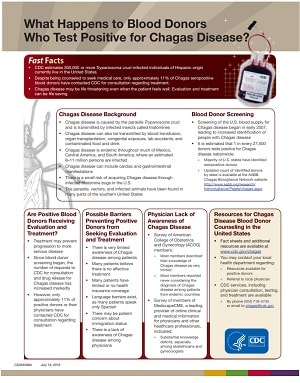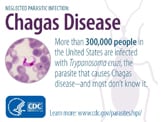What Happens to Blood Donors Who Test Positive for Chagas Disease?
Fast Facts
- CDC estimates 300,000 or more Trypanosoma cruzi-infected individuals of Hispanic origin currently live in the United States.
- Despite being counseled to seek medical care, only approximately 11% of Chagas seropositive blood donors have contacted CDC for consultation regarding treatment.
- Chagas disease may be life threatening even when the patient feels well. Evaluation and treatment can be life saving.
Chagas Disease Background
- Chagas disease is caused by the parasite Trypanosoma cruzi and is transmitted by infected insects called triatomines
- Chagas disease can also be transmitted by blood transfusion, organ transplantation, congenital exposure, lab accidents, and contaminated food and drink
- Chagas disease is endemic throughout much of Mexico, Central America, and South America, where an estimated 8–11 million persons are infected
- Chagas disease can include cardiac and gastrointestinal manifestations
- There is a small risk of acquiring Chagas disease through infected triatomine bugs in the U.S.
- The parasite, vectors, and infected animals have been found in many parts of the southern United States
Blood Donor Screening
- Screening of the U.S. blood supply for Chagas disease began in early 2007, leading to increased identification of people with Chagas disease
- It is estimated that 1 in every 27,500 donors tests positive for Chagas disease nationwide:
- Majority of U.S. states have identified seropositive donors
- Updated count of identified donors by state is available at the AABB Chagas Biovigilance Network website: http://www.aabb.org/research/hemovigilance/Pages/chagas.aspx
Are Positive Blood Donors Receiving Evaluation and Treatment?
- Treatment may prevent progression to more serious disease
- Since blood donor screening began, the number of requests to CDC for consultation and drug release for Chagas disease has increased markedly
- However, only approximately 11% of positive donors or their physicians have contacted CDC for consultation regarding treatment
Possible Barriers Preventing Positive Donors from Seeking Evaluation and Treatment
- There is very limited awareness of Chagas disease among patients
- Many patients believe there is no effective treatment
- Many patients have limited or no health insurance coverage
- Language barriers exist, as many patients speak only Spanish
- There may be patient concern about immigration status
- There is a lack of awareness of Chagas disease among physicians
Physician Lack of Awareness of Chagas Disease
- Survey of American College of Obstetrics and Gynecology (ACOG) members:
- Most members described their knowledge of Chagas disease as very limited
- Most members reported never considering the diagnosis of Chagas disease among patients from endemic countries
- Survey of members of MedscapeCME, a leading provider of online clinical and medical information for physicians and other healthcare professionals, indicated:
- Substantial knowledge deficits, especially among obstetricians and gynecologists
Resources for Chagas Disease Blood Donor Counseling in the United States
Toxocariasis is a preventable disease. Healthcare providers should counsel patients on prevention strategies, including:
- Fact sheets and additional resources are available at www.cdc.gov/chagas
- You may contact your local health department regarding:
- Resources available for positive donors
- Referral to local physician
- CDC services, including physician consultation, testing, and treatment are available
- By phone (404) 718-4745 or email to chagas@cdc.gov

